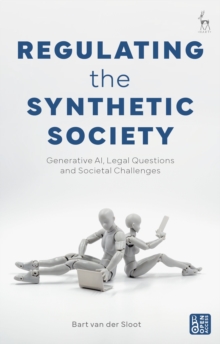Description
| Product ID: | 9781509974931 |
| Product Form: | Paperback / softback |
| Country of Manufacture: | GB |
| Title: | Regulating the Synthetic Society |
| Subtitle: | Generative AI, Legal Questions, and Societal Challenges |
| Authors: | Author: Bart van der Sloot |
| Page Count: | 296 |
| Subjects: | IT and Communications law / Postal laws and regulations, IT & Communications law, Europe |
| Description: | Experts predict that in 5 years’ time, more than 90% of all digital content will be wholly or partially AI generated. In a synthetic society, it may no longer be possible to establish what is real and what is not. Central to this open access book are 4 technologies on the frontline of this trend: humanoid robots, deepfakes, augmented reality, and virtual reality. Although they are only in their relative infancy, these technologies can already produce content that is indistinguishable from authentic material. The impact of this new reality on democracy, the judicial system, the functioning of the press, as well as on personal relationships will be unprecedented. Van der Sloot describes the technological fundaments of each of those technologies and maps their positive uses for educational purposes as well as for the treatment of patients, for the entertainment and creative industries, and the retail and financial sectors. The book also conceptualises their negative uses for fraud, deception, exploitation, identity-theft and exploitation, and shows their deeper effects on the post-truth society, the privatisation of the public sphere, and the loss of individual autonomy and societal trust. The book evaluates how the current European legal paradigm applies to these technologies, focussing on the right to privacy and data protection, freedom of expression, procedural law, tort law, and the regulation of AI. It discusses regulatory alternatives to solve existing regulatory gaps and shows that there are no easy answers. The ebook editions of this book are available open access under a CC BY-NC-ND 4.0 licence on bloomsburycollections.com. Experts predict that in 5 years’ time, more than 90% of all digital content will be wholly or partially AI generated. In a synthetic society, it may no longer be possible to establish what is real and what is not. Central to this open access book are 4 technologies on the frontline of this trend: humanoid robots, deepfakes, augmented reality, and virtual reality. Although they are only in their relative infancy, these technologies can already produce content that is indistinguishable from authentic material. The impact of this new reality on democracy, the judicial system, the functioning of the press, as well as on personal relationships will be unprecedented. Van der Sloot describes the technological fundaments of each of those technologies and maps their positive uses for educational purposes as well as for the treatment of patients, for the entertainment and creative industries, and the retail and financial sectors. The book also conceptualises their negative uses for fraud, deception, exploitation, identity-theft and exploitation, and shows their deeper effects on the post-truth society, the privatisation of the public sphere, and the loss of individual autonomy and societal trust. The book evaluates how the current European legal paradigm applies to these technologies, focussing on the right to privacy and data protection, freedom of expression, procedural law, tort law, and the regulation of AI. It discusses regulatory alternatives to solve existing regulatory gaps and shows that there are no easy answers. The ebook editions of this book are available open access under a CC BY-NC-ND 4.0 licence on bloomsburycollections.com. |
| Imprint Name: | Hart Publishing |
| Publisher Name: | Bloomsbury Publishing PLC |
| Country of Publication: | GB |
| Publishing Date: | 2024-02-22 |


